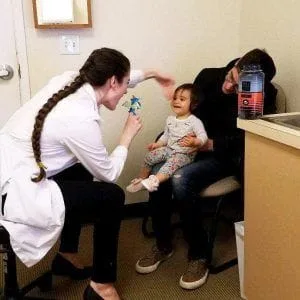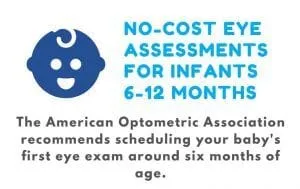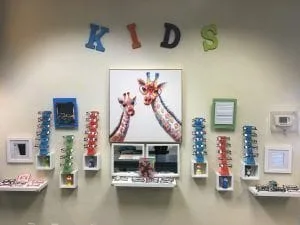
We recommend a baby’s first exam between 6 months and 1 year old, and annually starting at age 2. Every baby under 1 year old is welcome at Silicon Valley Eyecare for a no-cost comprehensive eye exam.
Extensive research has demonstrated the importance of the first few years of life in the development of vision. From birth, babies begin exploring the wonders in the world with their eyes. Even before they learn to reach and grab with their hands or crawl and sit-up, their eyes are providing information and stimulation important for their development. Healthy eyes and good vision play a critical role in how infants and children learn to see.
Eye and vision problems in infants can cause developmental delays and may lead to serious lifelong effects on vision. It is important to detect conditions early to ensure babies and children have the opportunity to develop the visual abilities they need to grow and learn. Pre-school and school aged children should continue annual exams to ensure healthy eyes and normal vision as they grow
Common Childhood Eye Problems
Children often do not realize that they cannot see well because they do not have a way to compare their vision with normal visual acuity. Therefore, it is very important to have your child visit Our doctors to determine if your child’s eyes are developing normally and if they can see clearly.
- Color Blindness – Color blindness is the inability to see colors clearly. The most common type is red/green color blindness, but children can also be blue/yellow colorblind and completely colorblind. While there’s no cure, certain lenses and phone apps can help individuals cope with this eye condition.
- Childhood Cataracts – Babies can be born with cataracts and children can develop them. Glasses can usually correct vision, but in severe cases, eye surgery may be needed.
- Depth Perception Problems – If your child has trouble with hand/eye coordination or catching or throwing balls, it could be due to a depth perception problem. When diagnosed early, vision therapy may help improve depth perception.
- Eye Tracking and Teaming – Vision therapy can help with tracking and teaming problems, which can make reading difficult, result in double-vision and cause problems focusing.
- Farsightedness – Farsightedness is the inability to see objects up close. Children with farsightedness may hold objects, books and papers away from their face in order to see them more clearly. Corrective lenses can help with this refractive error.
- Lazy Eye – A lazy eye usually develops prior to the age of six. This condition causes one eye to be significantly weaker in vision than the other eye. Eye patching and vision therapy can help strengthen a weak or lazy eye.
- Nearsightedness – Nearsightedness is getting more common in children. This is the inability to see objects at a distance. Glasses can help correct this refractive error. Ortho-k lenses may also be able to help stem the progression.
- Eye Infections – Pink eye and styes are common childhood eye infections. Our ophthalmologist can diagnose eye infections and recommend the appropriate course of treatment.
- Strabismus – Crossed eyes occur in about 5 percent of children and can result in double-vision. Treatment usually begins with vision therapy. However, in some cases, surgery may be needed to correct the crossed eyes.
Pediatric Eye Exams with Our Doctors
Childhood eye exams can catch eye problems early so that they can be corrected before they affect your child’s ability to develop hand/eye coordination, learn and read. Children should have their first eye exam at our office when they are six months old. This helps check the development of the eyes and diagnose problems with eye movement and focus. Your child’s next exam should be scheduled when they are 36 months old. If there are no eye problems or vision problems detected, your child won’t need another eye exam until the age of five or before they start preschool or kindergarten. Children, who need corrective lenses or vision therapy, will need to have eye exams every year. For school-aged children with no vision problems, we recommend scheduling an eye exam every two years.
To schedule your child’s next comprehensive eye exam with Our doctors to check for vision and eye health and movement problems, call us today at (408) 296-0511.



